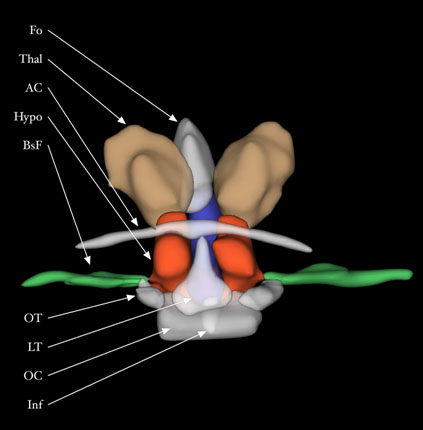Jill M. Goldstein, PhD

Biography
Jill M. Goldstein, Ph.D. is a Professor of Psychiatry and Medicine, Departments of Psychiatry and Medicine at Harvard Medical School and Director of Research, Connors Center for Women's Health & Gender Biology at Brigham and Women's Hospital. She is also a Consultant in Neuroscience in Psychiatry at Massachusetts General Hospital and Senior Scientist at Beth Israel-Deaconess Medical Center. Dr. Goldstein was originally trained in psychiatric epidemiology at the Columbia Graduate School of Arts and Sciences and in clinical psychopathology at the New York State Psychiatric Institute. Her post-doctoral training in clinical neuroscience and brain imaging was at Harvard in the Department of Behavioral Neurology at Beth Israel Hospital and Massachusetts General Hospital Athinoula Martinos Biomedical Imaging Center.Research Summary
Over the last 20 years, Dr. Goldstein has become an internationally-recognized expert on sex differences in the normal brain and how this may help us understand sex differences in psychiatric disorders such as schizophrenia and, more recently, mood disorders. She has published numerous articles in these areas and has received numerous awards to pursue this work. Her program of research, called the Clinical Neuroscience of Sex Differences in the Brain, consists of an interdisciplinary team of investigators, integrating structural and functional brain imaging studies, psychophysiology, neuroendocrine studies of hormones and brain function, genetics, and collaborative efforts with animal investigators studying genes, hormones and the brain. Her current work is particularly focused on investigating fetal antecedents to sex differences in adult onset psychiatric disorders with fetal origins and the co-morbidity between sex differences in psychiatric and general medical disorders, such as cardiovascular disease and the metabolic syndrome. She is currently the Principal Investigator of three NIH RO1 grants investigating sex differences in schizophrenia, affective psychoses, and major depression and its association with cardiovascular disease and a Specialized Center for Research (SCOR) funded by the NIH Office for Research on Women's Health & NIMH on "Fetal Antecedents to Sex Differences in Depression: A Translational Approach". She was recently named the 2007 Spinoza Professor by the Academic Medical Center, University of Amsterdam, for her work on the role of hormones, sex differences and the brain for understanding clinical disorders in medicine.Dr. Goldstein is also building a unique research infrastructure for the Connors Center at Brigham & Women's Hospital to foster collaborative efforts to understand mechanisms that explain sex differences in the health and disease across disciplines and methods of study and to provide a source of knowledge and training for future young scientists and clinicians in women's health and gender biology. To this end, she is also the Principal Investigator of a training grant of K-awards for junior faculty from the NIH Office of Research in Women's Health entitled, "Hormones & Genes in Women's Health: From Bench to Bedside".

Hypothalamus. Goldstein et al. Bio Psychiatry 2007
Selected Publications
- Goldstein, JM, Seidman, LJ, Horton, NJ, Makris, M, Kennedy, DN, Caviness, VS, Faraone, SV, Tsuang, MT. Normal sexual dimorphism of the adult human brain assessed by in-vivo magnetic resonance imaging, Cerebral Cortex, 2001, 11:490-497.
- Goldstein, JM, Seidman, LJ, O'Brien, L, Horton, N, Kennedy, DN, Makris, N, Caviness, VS, Faraone, SV, Tsuang, MT. Impact of normal sexual dimorphisms on sex differences in structural brain abnormalities in schizophrenia assessed by magnetic resonance imaging. Archives of General Psychiatry, 2002; 59:154-164.
- Goldstein, JM, Seidman, LJ, Buka, SL, Horton, NJ, Donatelli, JL, Zornberg,GL, Rieder, RO, Tsuang, MT. Impact of genetic vulnerability and hypoxia on overall intelligence by age 7 in offspring at high risk for schizophrenia compared with affective psychoses. Schizophr Bull, 2000, 26 (2): 323-334.
- Goldstein, JM, Jerram, M, Poldrack, R, Breiter, H, Makris, N, Goodman, JM, Tsuang, MT, Seidman, LJ. Sex differences in prefrontal brain activity during fMRI of auditory verbal working memory. Neuropsychology, 2005, 19 (4): 509-519.
- Goldstein, JM, Jerram, M, Poldrack, R, Kennedy, DN, Seidman, LJ, Makris, N. Hormonal cycle modulates arousal circuitry in women using fMRI. Journal of Neuroscience, 2005;25:9309-9316.
- Walder, DJ, Seidman, LJ, Cullen, N, Su, J, Tsuang, MT, Goldstein, JM. Sex differences in language dysfunction in schizophrenia. American Journal of Psychiatry, 2006;163:470-477.
- Walder, DJ, Seidman, LJ, Makris, N, Kennedy, DN, Tsuang, MT, Goldstein, JM. Neuroanatomic substrates of sex differences in language dysfunction in schizophrenia: A pilot study. Schizophrenia Research 2007 (90): 295-301.
- Goldstein, JM. Sex, hormones, and affective arousal dysfunction in schizophrenia. Hormones and Behavior, 2006; 50; 612-622.
- Goldstein, JM, Seidman, JL, Makris N, Ahern, T. O'Brien, LM, Caviness, VS, Kennedy, DN, Faraone, SV, Tsuang, MT. Hypothalamic abnormalities in schizophrenia: Sex effects & genetic vulnerability, Biological Psychiatry, 2007: 61: 935-945
